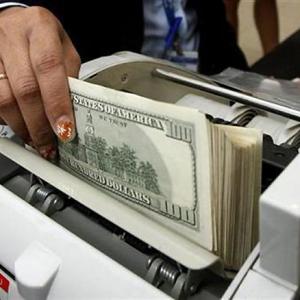 If India was able to provide additional and new information about people and entities that figure on stolen lists, they may consider it to exchange information
If India was able to provide additional and new information about people and entities that figure on stolen lists, they may consider it to exchange information
The high-level team that went to Switzerland earlier this week to work out ways to retrieve stolen money stored in Swiss banks did not travel with any names or lists.
The Indian team went to Bern, the Alpine nation’s capital, to work out modalities about how such monies and assets could be returned to India through a fast-track mechanism that currently covers only the European Union and the United States
“You don’t have to travel to Switzerland to know what the laws are. They are in the public domain -- the trip was aimed at adding momentum to calls from India to Switzerland at the highest levels to assist with retrieving what belongs to India,” a source close to the SIT told The News Minute.
The National Democratic Alliance government has inherited lists from the United Progressive Alliance-II (first circulated around 2010) and it contains names of people and entities stolen by a bank employee.
Among these are people and entities who may have evaded tax and others who are in legitimate business. Swiss sources had told TNM earlier this year if India was able to provide new and additional information about this list, it could be considered within the ambit of Swiss laws.
The fast-tracking to accommodate India goes beyond calls by the Organisation of Economic Cooperation and Development and the G-20 which had applied pressure on Switzerland to introduce automatic transfer of comparable to what happens with other European countries.
While some countries in Europe and the United States are already governed by this clause, other countries including India would not have been part of this packet before two years at the very least.
“The Swiss have agreed to help India but there is a rider -- they will not entertain fishing expeditions which is why the current trip is focusing on how to manage requirements of both governments,” the source said.
Senior counsel Ram Jethmalani is not convinced. Soon after filing an 800-word petition in the Supreme Court in New Delhi on Thursday, he said he was convinced no good will come out of the meetings between the two countries as there was no ‘political will’ to do so. “I am downcast -- this matter is being handled very badly and there are people in the government who would prefer a status-quo,” he said.
Much as it might seem long, these are early days to take a call on progress of the Special Investigating Team that is examining the issue of tax evasion and black money abroad -- one of the main campaign planks of the government. Its key remit was to bring stolen money back to India from a host of countries including Switzerland. A hundred days into its formation in late August, the SIT submitted an ‘action-taken’ report to the Supreme Court-monitored investigation.
There are two separate issues about money held by Indians in foreign banks including Switzerland and TNM has written extensively on the issue. One is money got from illegal sources which will now be handled by the automatic reporting mechanism if the process is fast-tracked.
The other is the Double Taxation Treaty Agreement signed by India a few years ago which ensures that Indians conducting legitimate business in Switzerland are not penalised by having to pay taxes in two countries.
Over the past decade, Swiss authorities have been changing their laws due to local pressure as well as some heavy hitting by the US government. On this side of the Atlantic, Germany and France have been among the very active in punishing their tax-evaders and circulating lists to other countries.
Earlier this year Swiss sources told TNM if India was able to provide additional and new information about people and entities that figure on stolen lists, they may consider it to exchange information.
Estimates of monies and assets under management by Indians in Switzerland range from billions to trillions suggesting very clearly that the SITs task is a difficult one. Earlier this year, the Swiss National bank said money held by Indians in 283 banks in the country was over two billion Swiss francs (Rs 14,000 crore). That was the good news.
The bad news was that there was nothing in the report entitled ‘Banks in Switzerland’ that could help the SIT to gauge what was legal and what was not.
That annual report was based on data in the banks’ (parent companies) individual financial statements as required by the law. Private deposits, commercial credit and commercial inter-banking activities are all part of this reporting exercise.
In the meantime, there have been reports in the Indian media about lists of names of Swiss bank account holders suggesting that leaking or planting a few names here and there is an activity in itself.
It remains unclear what the government is doing with all the accounts held in banks in London as well as the Cayman Islands and the British Virgin islands. Bankers and market-watchers say London is now the world’s most important tax-haven. They too are government by the OECD and G-20 which includes the United Kingdom.
Is London the next stop for the SIT?
Article Courtesy: The News Minute



.jpg)






